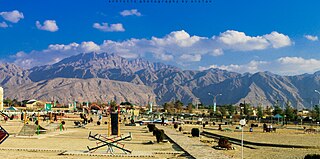2022 Quetta bombing may refer to:
2022 Quetta bombing may refer to:

Quetta is the tenth most populous city in Pakistan with a population of over 1.1 million. It is situated in south-west of the country close to the International border with Afghanistan. It is the capital of the province of Balochistan where it is the largest city. Quetta is at an average elevation of 1,680 metres above sea level, making it Pakistan's only high-altitude major city. The city is known as the "Fruit Garden of Pakistan" due to the numerous fruit orchards in and around it, and the large variety of fruits and dried fruit products produced there.

Zahedan is a city and capital of Sistan and Baluchestan Province, Iran. At the 2016 census, its population was 587,730.
The September 2010 Quetta bombing occurred on 3 September 2010 in Quetta, Pakistan. At least 73 people were killed and 206 injured when a bomb exploded in a Quds Day procession which Shias were carrying out to express solidarity with Palestinians.

The Hazaras have long been the subjects of persecution by both Afghanistan and Pakistan as well as non-state militant groups. The Hazaras are mostly from Afghanistan, primarily from the central regions of Afghanistan, known as Hazarajat. Significant communities of Hazara people also live in Quetta, Pakistan, and in Mashad, Iran, as part of the Hazara and Afghan diasporas.
On 16 February 2013, at least 91 people were killed and 190 injured after a bomb hidden in a water tank exploded at a market in Hazara Town on the outskirts of Quetta, the capital city of Balochistan, Pakistan. Most of the victims were members of the predominantly Shia Twelver ethnic Hazara community, and authorities expected the death toll to rise due to the large number of serious injuries. The Lashkar-e-Jhangvi group claimed responsibility for the blast, the second major attack against the Shia Hazaras in a month.

The 2015 Quetta bus bombing occurred on 19 October 2015 in Quetta a city in Balochistan. The blast killed at least 11 people and another 22 were injured.

On 8 August 2016, terrorists attacked the Government Hospital of Quetta in Pakistan with a suicide bombing and shooting. They killed more than 70 people, mainly lawyers, and injured more than 130 others. The fatalities were mainly advocates (lawyers) who had assembled at the hospital where the body of Advocate Bilal Anwar Kasi, the president of Balochistan Bar Association, was brought after he was shot dead by an unknown gunman. Responsibility for the attack has been claimed by various Islamist groups like Jamaat-ul-Ahrar and the Islamic State. Between 70 and 94 people were killed and over 120 injured. 54 of those killed were lawyers.
On 16 September 2016, a bombing in a mosque left 36 people dead and 34 injured. The bombing comes only a few days after another one that killed at least 14 people and wounded 60.

On 24 October 2016, three heavily armed terrorists carried out an attack on the Balochistan police training college in Quetta, Pakistan, killing 61 cadets and injuring more than 165 others. The Islamic State of Iraq and the Levant – Khorasan Province claimed responsibility for the attack, and Pakistan-based Lashkar-e-Jhangvi claimed to have collaborated with them. According to Pakistani authorities, the assailants came from Afghanistan and were in contact with their handlers there while perpetrating the attack.
Quetta attack may refer to:
Operation Radd-ul-Fasaad is a codename of a combined military operation by the Pakistani military in support of local law enforcement agencies to disarm and eliminate the terrorist sleeper cells across all states of Pakistan, started on 22 February 2017. The operation is aimed to eliminate the threat of terrorism, and consolidating the gains of Operation Zarb-e-Azb which was launched in 2014 as a joint military offensive. It is further aimed at ensuring the security of Pakistan's borders. The operation is ongoing active participation from Pakistan Army, Pakistan Air Force, Pakistan Navy, Pakistan Police and other Warfare and Civil Armed Forces managed under the Government of Pakistan. More than 375,000 operations have been carried out against terrorists so far. This Operation has been mostly acknowledged after Operation Zarb e Azb.
On 23 June 2017, a series of terrorist attacks took place in Pakistan resulting in 96 dead and over 200 wounded. They included a suicide bombing in Quetta targeting policemen, followed by a double bombing at a market in Parachinar, and the targeted killing of four policemen in Karachi.
On 12 August 2017, a suicide bombing took place near a Pakistan army truck in Quetta, Balochistan, Pakistan, leaving 15 people dead including 8 soldiers, while injuring 40 others. The Islamic State of Iraq and the Levant – Khorasan Province claimed responsibility for the attack.
This article is a chronological outline of terrorist incidents in Pakistan in 2018.
2020 Quetta bombing may refer to:
2021 Quetta bombing may refer to:
This article is an incomplete outline of terrorist incidents in Pakistan in 2022 in chronological order.
At about 7pm on 2 March 2022, a bomb exploded near a police mobile on Fatima Jinnah Road in Quetta, Balochistan, Pakistan. It killed three people and injured 25 others, leaving six of them in critical condition.
On 30 November 2022, a suicide bombing of a police truck in Quetta, Balochistan, Pakistan, killed three people and injured 27 others, including 23 corps. The police were travelling to protect polio vaccinators.